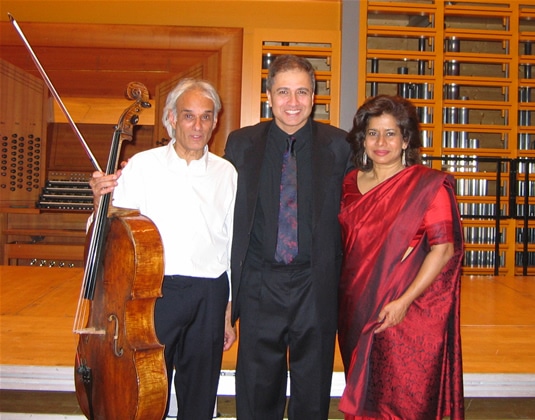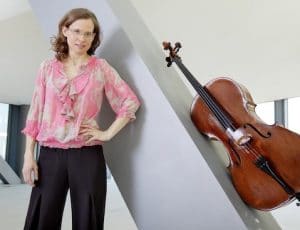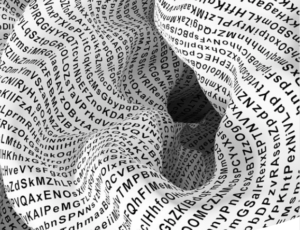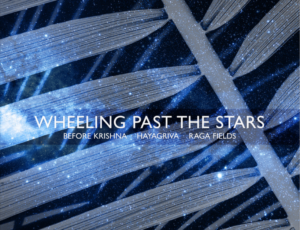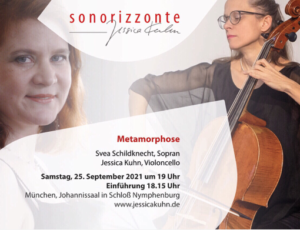Wheeling Past the Stars
Song Cycle of settings of poems by Rabindranath Tagore (trans. William Radice)
YEAR: 2007
ORCHESTRATION: Soprano and Violoncello
DURATION: 23'
LANGUAGE: English (translated from the original in Bengali)
COMMISSIONED BY: S'dwestrundfunk, Stuttgart
DEDICATION: Patricia Rozario and Rohan de Saram
AVAILABILITY: Scores and information available directly from Param Vir
PREMIERE INFORMATION:
7 November, 2007
Patricia Rozario and Rohan de Saram
Stuttgart
“The music had a quiet sumptuousness, the vocal lines beautifully drawn out, the accompaniment sweetly harmonious, de Saram’s double-stopping as mellifluous as the singing.” – Paul Driver, The Sunday Times 20 July 2008
INTRODUCTION:
This cycle of four settings of Tagore poetry was composed at the request of cellist Rohan de Saram in 1997. The four poems are selected for their variety of feeling and rhythmic pace. Together they form a small portrait of Tagore.
WORK NOTES:
This performance above is of the 2nd, 3rd and 4th songs.
Performance of WHEELING PAST THE STARS 13 March 2015
Johannissall, Schloss Nymphenburg, Munich
by Suzanne Fischer – soprano
and Jessica Kuhn – cello
When I was asked by cellist Rohan de Saram to compose a song cycle for Soprano and Cello, he was very specific that he wanted it to be based on the work of an Indian poet. Tagore has had a great influence on me since my childhood, and so it was natural to turn to him for inspiration.
I chose these four Tagore poems to try to create a balanced cycle. There is one love poem, one about nature, one somewhat political and one for children. All of the poems have an immensely attractive rhythmic gait, and are varied in tone and pace.
In Unending Love, I was drawn particularly to the lengthy lines of each verse. But long lines are difficult to ‘set’. They demand rather special care as the extended stretches of melody must also carry forward the meaning, respect the punctuation and give expression to the inner compulsion of the text, whilst still maintaining clarity and drive in the purely musical and harmonic rhetoric, so that the line does not slump or drag. All this must happen in the course of each 5-line verse, which in the case of verses 2 and 4 contains a full-stop only at the very end of the verse. So the melody must accommodate a long stretch of meaning, semantically and musically. l found that challenging (in a positive way) and interesting to deal with, as I composed the melody.
These settings for solo cello and voice allowed me to write pure two-part counterpoint, as the voice and the cello lines entwine around each other in a tender and sometimes dramatic union. Simplicity was at the heart of these songs, and their modality hovers around Modes of Limited Transposition, (terminology from Messiaen) – especially an octatonic scale that is completely symmetrical and unlike a major or minor scale, being a succession of consecutive major and minor seconds. The intervals of the seconds thus feature throughout, and are especially friendly and gentle intervals, easy to sing and to draw out long lines in, without losing comprehensibility.
Tagore has the extraordinary ability to take the simplest of things and link it to something profound. His nature poem here, Palm-tree becomes almost metaphysical in reach as the words conjure up a mother-child theme. The cello must conjure up a wind and then a storm that the soprano must ride, as she rises with the tree towards the stars. The third song Grandfather’s Holiday is quite disjunct in intervallic use, to reflect the playful spirit of the poem. Some of the rhythms form a kind of nursery patter which I have retained in the setting. The last song New Birth is serious in tone, and its politics and humanity were very close to Tagore’s spirit and social conscience. It seemed the most appropriate song to end the cycle with, and the intense counterpoint between voice and cello underlines its intensity of mood and message.
‘Wheeling Past the Stars’ will feature on a portrait CD performed by Patricia Auchterlonie, soprano and Ulrich Heinen, cello, due for release on NMC in 2021. Producer / engineer David Lefeber writes about the recording sessions on 26 October 2020 here.
The Sunday Times (20 July 2008)
Reviewer: Paul Driver
The music had a quiet sumptuousness, the vocal lines beautifully drawn out, the accompaniment sweetly harmonious, de Saram’s double-stopping as mellifluous as the singing.

